Numeracy and Data Analysis Report: Humidity Data of Nottingham, UK
VerifiedAdded on 2023/01/16
|8
|1398
|79
Report
AI Summary
This report presents a data analysis of humidity data collected over ten days in Nottingham, UK. The analysis begins with the representation of data in tabular form, followed by visual representations using bar and column charts. The report then proceeds to calculate key statistical measures including mean, median, mode, range, and standard deviation. Furthermore, the report applies a linear regression model to forecast humidity levels for the 15th and 20th days, providing detailed calculations of the 'm' and 'c' values in the linear equation. The findings demonstrate the application of various data analysis techniques to interpret and predict environmental data, concluding with a summary of the results and references to the sources used.
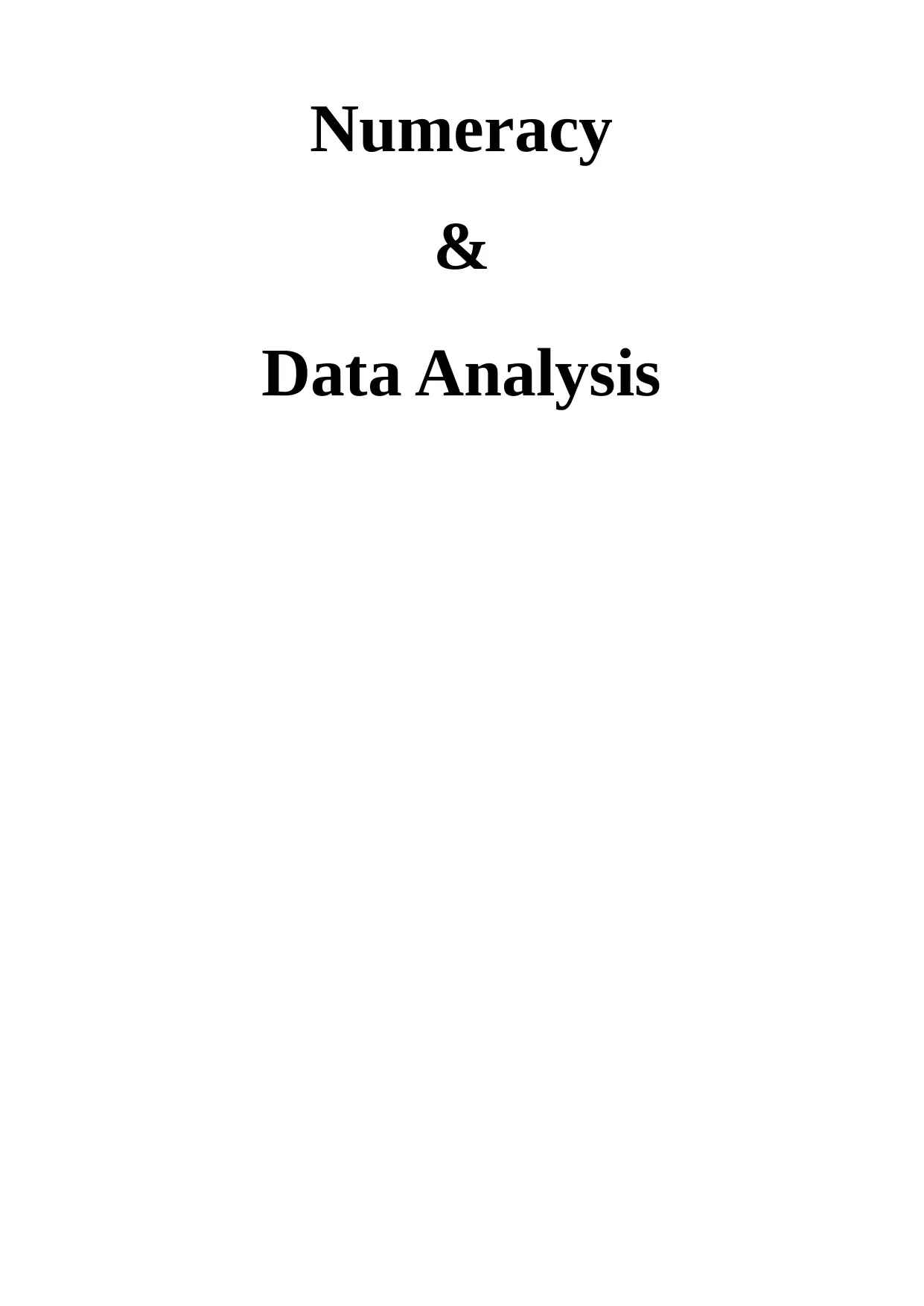
Numeracy
&
Data Analysis
&
Data Analysis
Paraphrase This Document
Need a fresh take? Get an instant paraphrase of this document with our AI Paraphraser
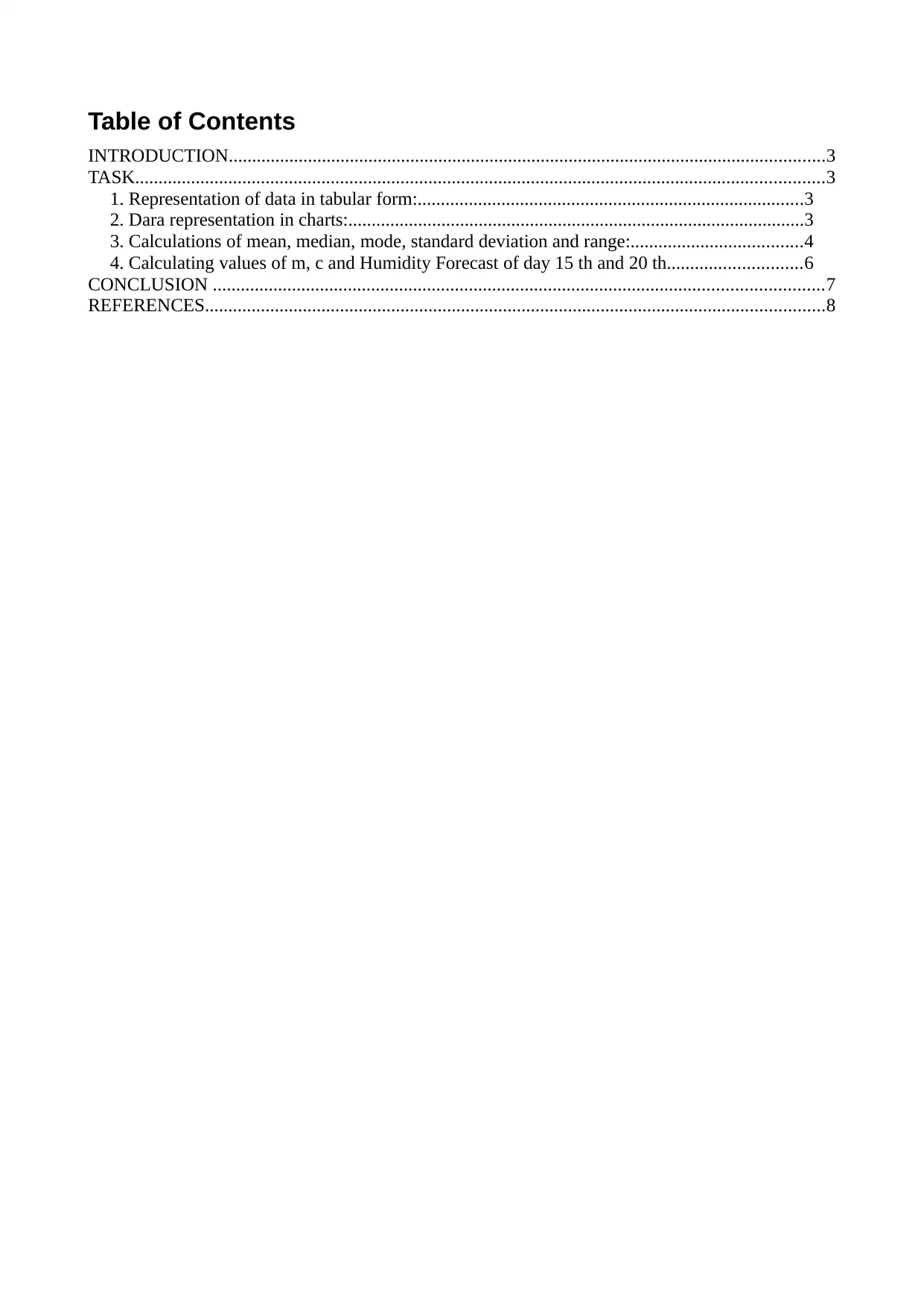
Table of Contents
INTRODUCTION................................................................................................................................3
TASK....................................................................................................................................................3
1. Representation of data in tabular form:...................................................................................3
2. Dara representation in charts:..................................................................................................3
3. Calculations of mean, median, mode, standard deviation and range:.....................................4
4. Calculating values of m, c and Humidity Forecast of day 15 th and 20 th.............................6
CONCLUSION ...................................................................................................................................7
REFERENCES.....................................................................................................................................8
INTRODUCTION................................................................................................................................3
TASK....................................................................................................................................................3
1. Representation of data in tabular form:...................................................................................3
2. Dara representation in charts:..................................................................................................3
3. Calculations of mean, median, mode, standard deviation and range:.....................................4
4. Calculating values of m, c and Humidity Forecast of day 15 th and 20 th.............................6
CONCLUSION ...................................................................................................................................7
REFERENCES.....................................................................................................................................8
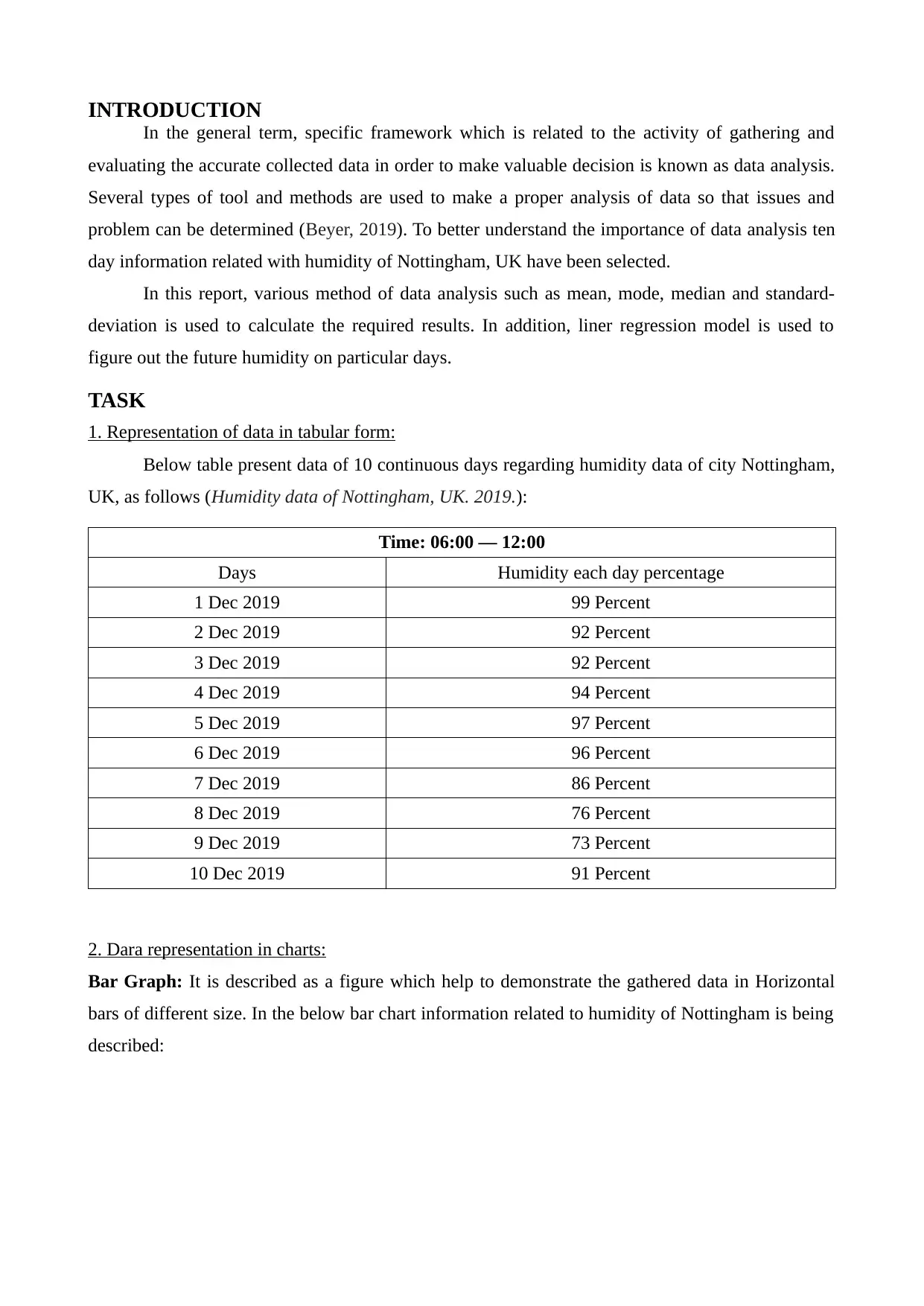
INTRODUCTION
In the general term, specific framework which is related to the activity of gathering and
evaluating the accurate collected data in order to make valuable decision is known as data analysis.
Several types of tool and methods are used to make a proper analysis of data so that issues and
problem can be determined (Beyer, 2019). To better understand the importance of data analysis ten
day information related with humidity of Nottingham, UK have been selected.
In this report, various method of data analysis such as mean, mode, median and standard-
deviation is used to calculate the required results. In addition, liner regression model is used to
figure out the future humidity on particular days.
TASK
1. Representation of data in tabular form:
Below table present data of 10 continuous days regarding humidity data of city Nottingham,
UK, as follows (Humidity data of Nottingham, UK. 2019.):
Time: 06:00 — 12:00
Days Humidity each day percentage
1 Dec 2019 99 Percent
2 Dec 2019 92 Percent
3 Dec 2019 92 Percent
4 Dec 2019 94 Percent
5 Dec 2019 97 Percent
6 Dec 2019 96 Percent
7 Dec 2019 86 Percent
8 Dec 2019 76 Percent
9 Dec 2019 73 Percent
10 Dec 2019 91 Percent
2. Dara representation in charts:
Bar Graph: It is described as a figure which help to demonstrate the gathered data in Horizontal
bars of different size. In the below bar chart information related to humidity of Nottingham is being
described:
In the general term, specific framework which is related to the activity of gathering and
evaluating the accurate collected data in order to make valuable decision is known as data analysis.
Several types of tool and methods are used to make a proper analysis of data so that issues and
problem can be determined (Beyer, 2019). To better understand the importance of data analysis ten
day information related with humidity of Nottingham, UK have been selected.
In this report, various method of data analysis such as mean, mode, median and standard-
deviation is used to calculate the required results. In addition, liner regression model is used to
figure out the future humidity on particular days.
TASK
1. Representation of data in tabular form:
Below table present data of 10 continuous days regarding humidity data of city Nottingham,
UK, as follows (Humidity data of Nottingham, UK. 2019.):
Time: 06:00 — 12:00
Days Humidity each day percentage
1 Dec 2019 99 Percent
2 Dec 2019 92 Percent
3 Dec 2019 92 Percent
4 Dec 2019 94 Percent
5 Dec 2019 97 Percent
6 Dec 2019 96 Percent
7 Dec 2019 86 Percent
8 Dec 2019 76 Percent
9 Dec 2019 73 Percent
10 Dec 2019 91 Percent
2. Dara representation in charts:
Bar Graph: It is described as a figure which help to demonstrate the gathered data in Horizontal
bars of different size. In the below bar chart information related to humidity of Nottingham is being
described:
⊘ This is a preview!⊘
Do you want full access?
Subscribe today to unlock all pages.

Trusted by 1+ million students worldwide
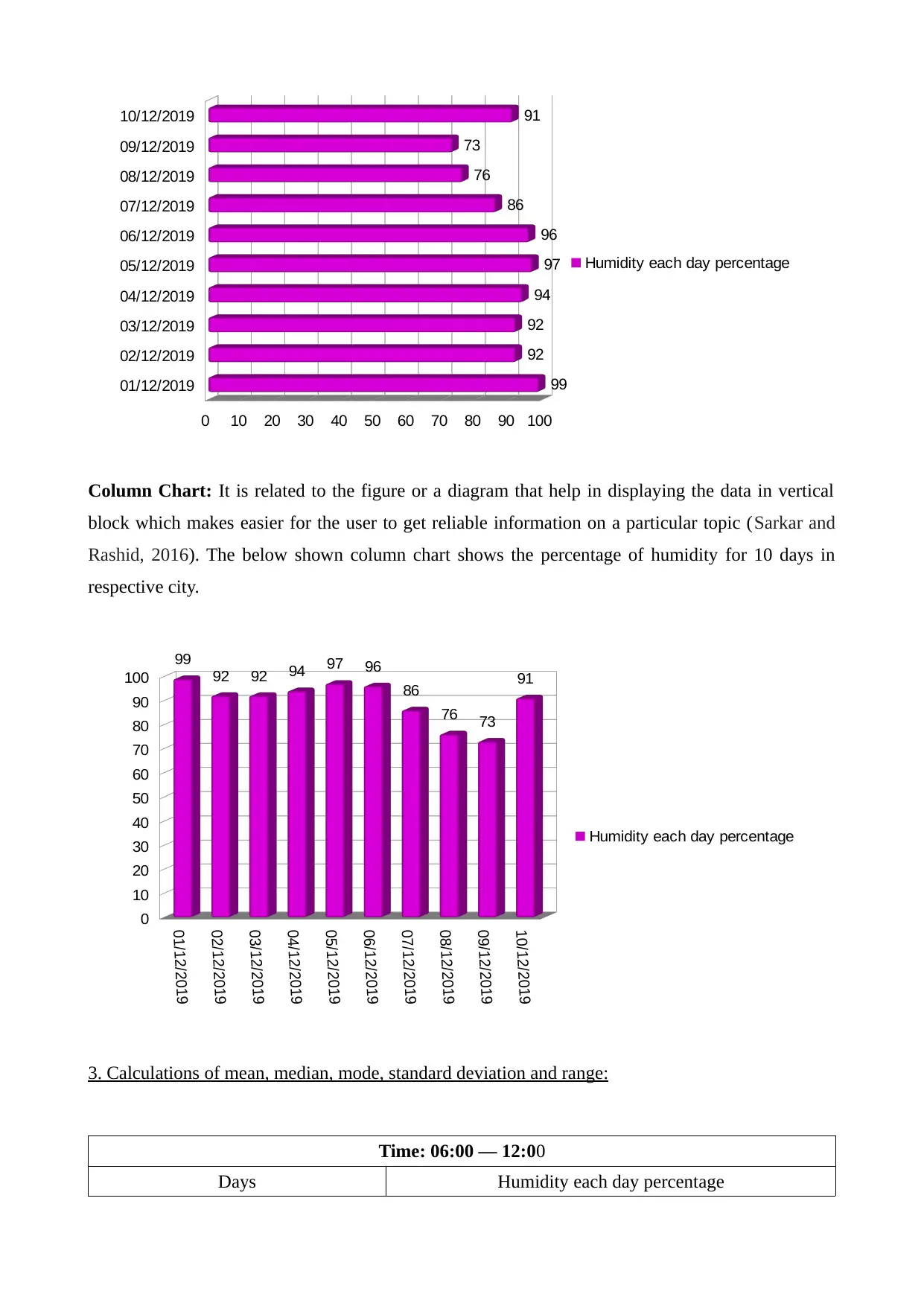
Column Chart: It is related to the figure or a diagram that help in displaying the data in vertical
block which makes easier for the user to get reliable information on a particular topic (Sarkar and
Rashid, 2016). The below shown column chart shows the percentage of humidity for 10 days in
respective city.
3. Calculations of mean, median, mode, standard deviation and range:
Time: 06:00 — 12:00
Days Humidity each day percentage
01/12/2019
02/12/2019
03/12/2019
04/12/2019
05/12/2019
06/12/2019
07/12/2019
08/12/2019
09/12/2019
10/12/2019
0 10 20 30 40 50 60 70 80 90 100
99
92
92
94
97
96
86
76
73
91
Humidity each day percentage
01/12/2019
02/12/2019
03/12/2019
04/12/2019
05/12/2019
06/12/2019
07/12/2019
08/12/2019
09/12/2019
10/12/2019
0
10
20
30
40
50
60
70
80
90
100
99
92 92 94 97 96
86
76 73
91
Humidity each day percentage
block which makes easier for the user to get reliable information on a particular topic (Sarkar and
Rashid, 2016). The below shown column chart shows the percentage of humidity for 10 days in
respective city.
3. Calculations of mean, median, mode, standard deviation and range:
Time: 06:00 — 12:00
Days Humidity each day percentage
01/12/2019
02/12/2019
03/12/2019
04/12/2019
05/12/2019
06/12/2019
07/12/2019
08/12/2019
09/12/2019
10/12/2019
0 10 20 30 40 50 60 70 80 90 100
99
92
92
94
97
96
86
76
73
91
Humidity each day percentage
01/12/2019
02/12/2019
03/12/2019
04/12/2019
05/12/2019
06/12/2019
07/12/2019
08/12/2019
09/12/2019
10/12/2019
0
10
20
30
40
50
60
70
80
90
100
99
92 92 94 97 96
86
76 73
91
Humidity each day percentage
Paraphrase This Document
Need a fresh take? Get an instant paraphrase of this document with our AI Paraphraser
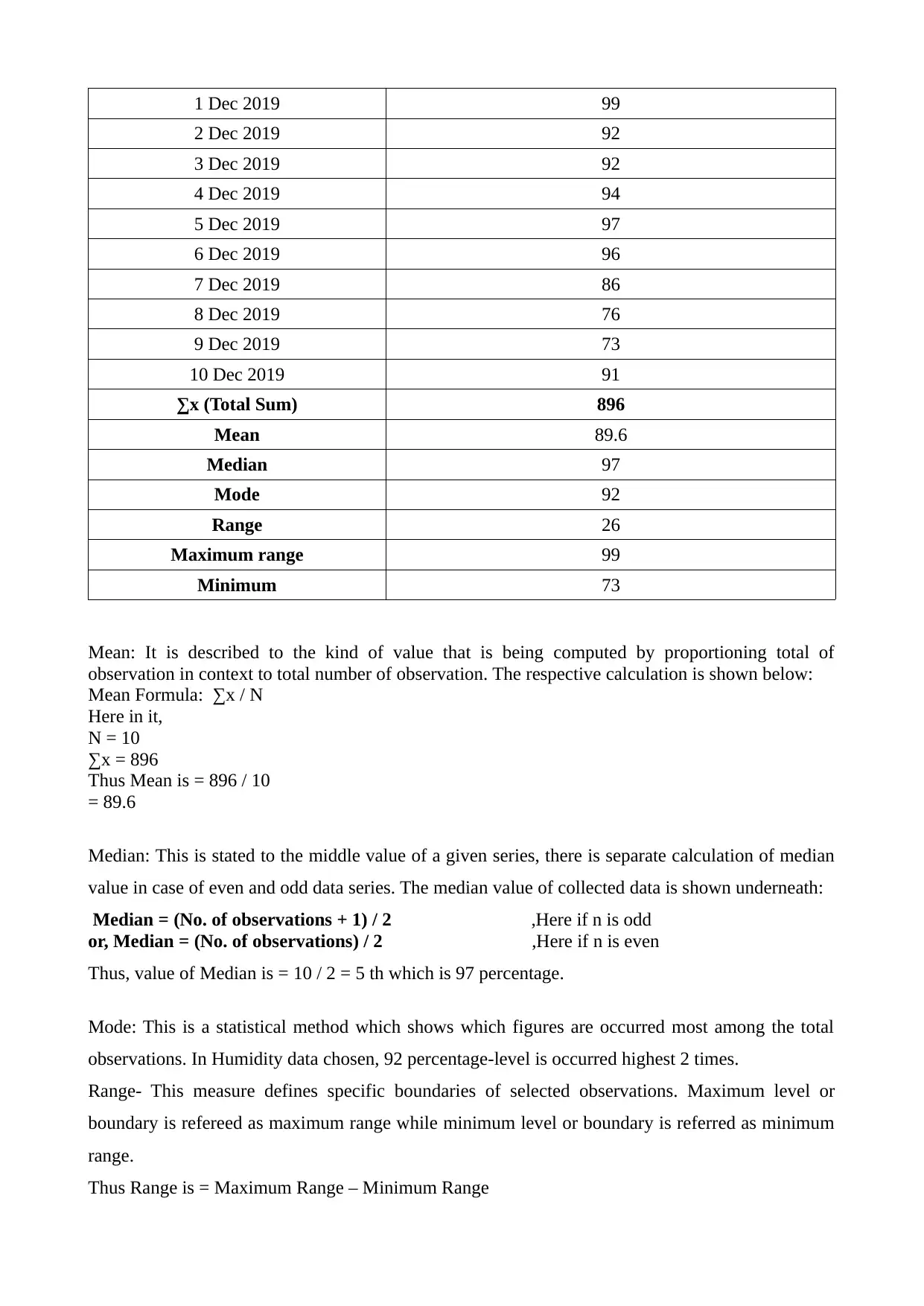
1 Dec 2019 99
2 Dec 2019 92
3 Dec 2019 92
4 Dec 2019 94
5 Dec 2019 97
6 Dec 2019 96
7 Dec 2019 86
8 Dec 2019 76
9 Dec 2019 73
10 Dec 2019 91
∑x (Total Sum) 896
Mean 89.6
Median 97
Mode 92
Range 26
Maximum range 99
Minimum 73
Mean: It is described to the kind of value that is being computed by proportioning total of
observation in context to total number of observation. The respective calculation is shown below:
Mean Formula: ∑x / N
Here in it,
N = 10
∑x = 896
Thus Mean is = 896 / 10
= 89.6
Median: This is stated to the middle value of a given series, there is separate calculation of median
value in case of even and odd data series. The median value of collected data is shown underneath:
Median = (No. of observations + 1) / 2 ,Here if n is odd
or, Median = (No. of observations) / 2 ,Here if n is even
Thus, value of Median is = 10 / 2 = 5 th which is 97 percentage.
Mode: This is a statistical method which shows which figures are occurred most among the total
observations. In Humidity data chosen, 92 percentage-level is occurred highest 2 times.
Range- This measure defines specific boundaries of selected observations. Maximum level or
boundary is refereed as maximum range while minimum level or boundary is referred as minimum
range.
Thus Range is = Maximum Range – Minimum Range
2 Dec 2019 92
3 Dec 2019 92
4 Dec 2019 94
5 Dec 2019 97
6 Dec 2019 96
7 Dec 2019 86
8 Dec 2019 76
9 Dec 2019 73
10 Dec 2019 91
∑x (Total Sum) 896
Mean 89.6
Median 97
Mode 92
Range 26
Maximum range 99
Minimum 73
Mean: It is described to the kind of value that is being computed by proportioning total of
observation in context to total number of observation. The respective calculation is shown below:
Mean Formula: ∑x / N
Here in it,
N = 10
∑x = 896
Thus Mean is = 896 / 10
= 89.6
Median: This is stated to the middle value of a given series, there is separate calculation of median
value in case of even and odd data series. The median value of collected data is shown underneath:
Median = (No. of observations + 1) / 2 ,Here if n is odd
or, Median = (No. of observations) / 2 ,Here if n is even
Thus, value of Median is = 10 / 2 = 5 th which is 97 percentage.
Mode: This is a statistical method which shows which figures are occurred most among the total
observations. In Humidity data chosen, 92 percentage-level is occurred highest 2 times.
Range- This measure defines specific boundaries of selected observations. Maximum level or
boundary is refereed as maximum range while minimum level or boundary is referred as minimum
range.
Thus Range is = Maximum Range – Minimum Range
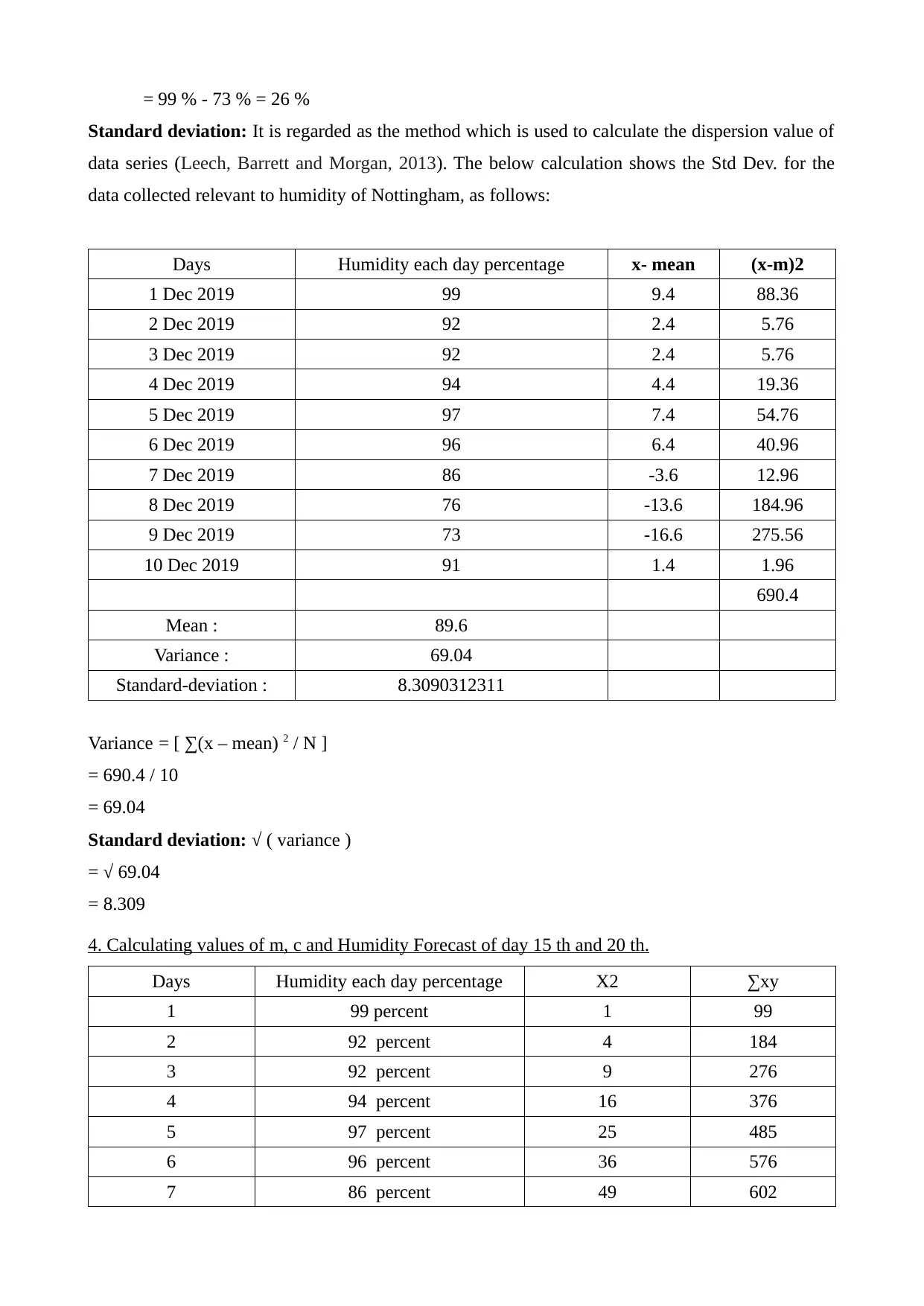
= 99 % - 73 % = 26 %
Standard deviation: It is regarded as the method which is used to calculate the dispersion value of
data series (Leech, Barrett and Morgan, 2013). The below calculation shows the Std Dev. for the
data collected relevant to humidity of Nottingham, as follows:
Days Humidity each day percentage x- mean (x-m)2
1 Dec 2019 99 9.4 88.36
2 Dec 2019 92 2.4 5.76
3 Dec 2019 92 2.4 5.76
4 Dec 2019 94 4.4 19.36
5 Dec 2019 97 7.4 54.76
6 Dec 2019 96 6.4 40.96
7 Dec 2019 86 -3.6 12.96
8 Dec 2019 76 -13.6 184.96
9 Dec 2019 73 -16.6 275.56
10 Dec 2019 91 1.4 1.96
690.4
Mean : 89.6
Variance : 69.04
Standard-deviation : 8.3090312311
Variance = [ ∑(x – mean) 2 / N ]
= 690.4 / 10
= 69.04
Standard deviation: √ ( variance )
= √ 69.04
= 8.309
4. Calculating values of m, c and Humidity Forecast of day 15 th and 20 th.
Days Humidity each day percentage X2 ∑xy
1 99 percent 1 99
2 92 percent 4 184
3 92 percent 9 276
4 94 percent 16 376
5 97 percent 25 485
6 96 percent 36 576
7 86 percent 49 602
Standard deviation: It is regarded as the method which is used to calculate the dispersion value of
data series (Leech, Barrett and Morgan, 2013). The below calculation shows the Std Dev. for the
data collected relevant to humidity of Nottingham, as follows:
Days Humidity each day percentage x- mean (x-m)2
1 Dec 2019 99 9.4 88.36
2 Dec 2019 92 2.4 5.76
3 Dec 2019 92 2.4 5.76
4 Dec 2019 94 4.4 19.36
5 Dec 2019 97 7.4 54.76
6 Dec 2019 96 6.4 40.96
7 Dec 2019 86 -3.6 12.96
8 Dec 2019 76 -13.6 184.96
9 Dec 2019 73 -16.6 275.56
10 Dec 2019 91 1.4 1.96
690.4
Mean : 89.6
Variance : 69.04
Standard-deviation : 8.3090312311
Variance = [ ∑(x – mean) 2 / N ]
= 690.4 / 10
= 69.04
Standard deviation: √ ( variance )
= √ 69.04
= 8.309
4. Calculating values of m, c and Humidity Forecast of day 15 th and 20 th.
Days Humidity each day percentage X2 ∑xy
1 99 percent 1 99
2 92 percent 4 184
3 92 percent 9 276
4 94 percent 16 376
5 97 percent 25 485
6 96 percent 36 576
7 86 percent 49 602
⊘ This is a preview!⊘
Do you want full access?
Subscribe today to unlock all pages.

Trusted by 1+ million students worldwide
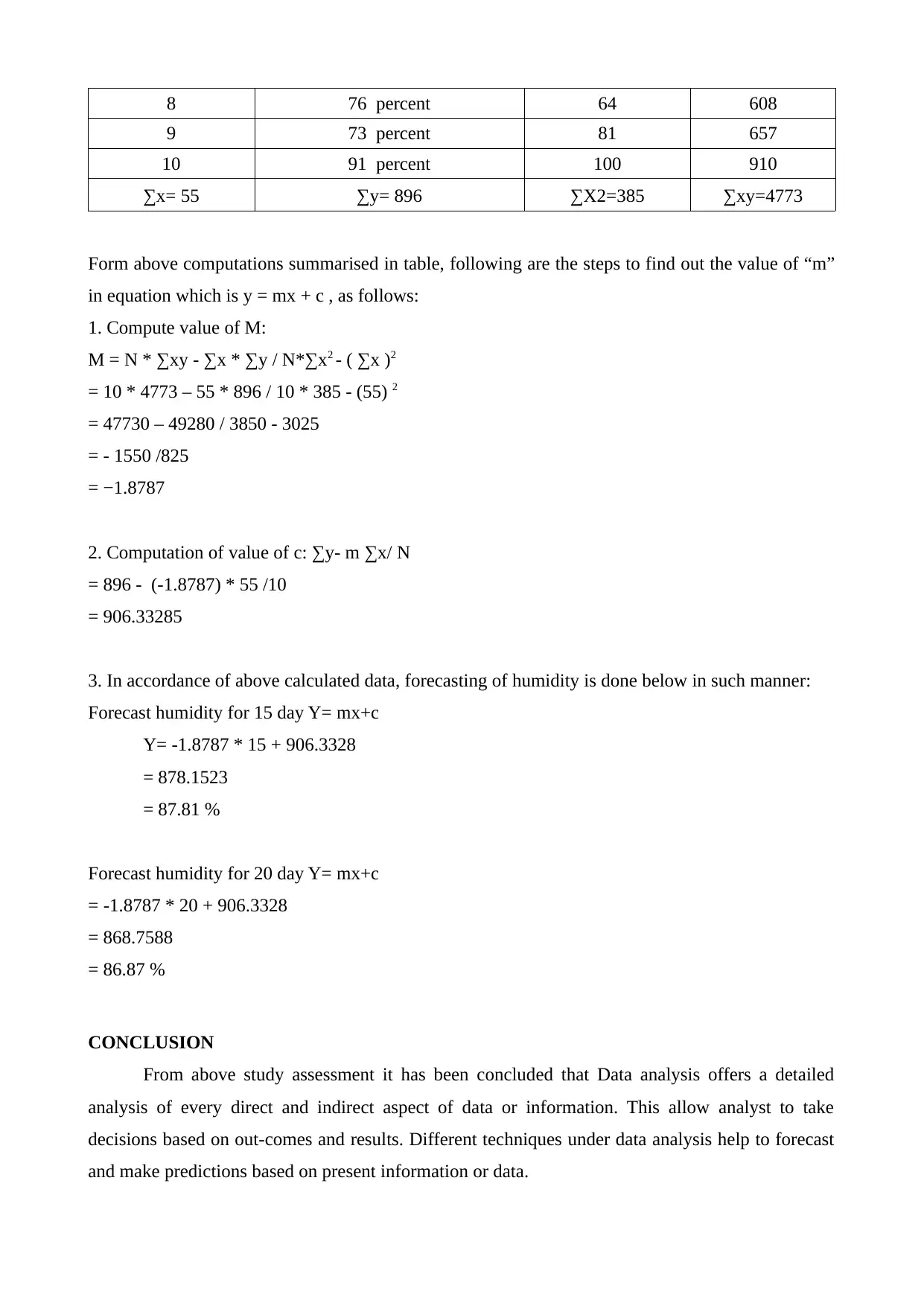
8 76 percent 64 608
9 73 percent 81 657
10 91 percent 100 910
∑x= 55 ∑y= 896 ∑X2=385 ∑xy=4773
Form above computations summarised in table, following are the steps to find out the value of “m”
in equation which is y = mx + c , as follows:
1. Compute value of M:
M = N * ∑xy - ∑x * ∑y / N*∑x2 - ( ∑x )2
= 10 * 4773 – 55 * 896 / 10 * 385 - (55) 2
= 47730 – 49280 / 3850 - 3025
= - 1550 /825
= −1.8787
2. Computation of value of c: ∑y- m ∑x/ N
= 896 - (-1.8787) * 55 /10
= 906.33285
3. In accordance of above calculated data, forecasting of humidity is done below in such manner:
Forecast humidity for 15 day Y= mx+c
Y= -1.8787 * 15 + 906.3328
= 878.1523
= 87.81 %
Forecast humidity for 20 day Y= mx+c
= -1.8787 * 20 + 906.3328
= 868.7588
= 86.87 %
CONCLUSION
From above study assessment it has been concluded that Data analysis offers a detailed
analysis of every direct and indirect aspect of data or information. This allow analyst to take
decisions based on out-comes and results. Different techniques under data analysis help to forecast
and make predictions based on present information or data.
9 73 percent 81 657
10 91 percent 100 910
∑x= 55 ∑y= 896 ∑X2=385 ∑xy=4773
Form above computations summarised in table, following are the steps to find out the value of “m”
in equation which is y = mx + c , as follows:
1. Compute value of M:
M = N * ∑xy - ∑x * ∑y / N*∑x2 - ( ∑x )2
= 10 * 4773 – 55 * 896 / 10 * 385 - (55) 2
= 47730 – 49280 / 3850 - 3025
= - 1550 /825
= −1.8787
2. Computation of value of c: ∑y- m ∑x/ N
= 896 - (-1.8787) * 55 /10
= 906.33285
3. In accordance of above calculated data, forecasting of humidity is done below in such manner:
Forecast humidity for 15 day Y= mx+c
Y= -1.8787 * 15 + 906.3328
= 878.1523
= 87.81 %
Forecast humidity for 20 day Y= mx+c
= -1.8787 * 20 + 906.3328
= 868.7588
= 86.87 %
CONCLUSION
From above study assessment it has been concluded that Data analysis offers a detailed
analysis of every direct and indirect aspect of data or information. This allow analyst to take
decisions based on out-comes and results. Different techniques under data analysis help to forecast
and make predictions based on present information or data.
Paraphrase This Document
Need a fresh take? Get an instant paraphrase of this document with our AI Paraphraser
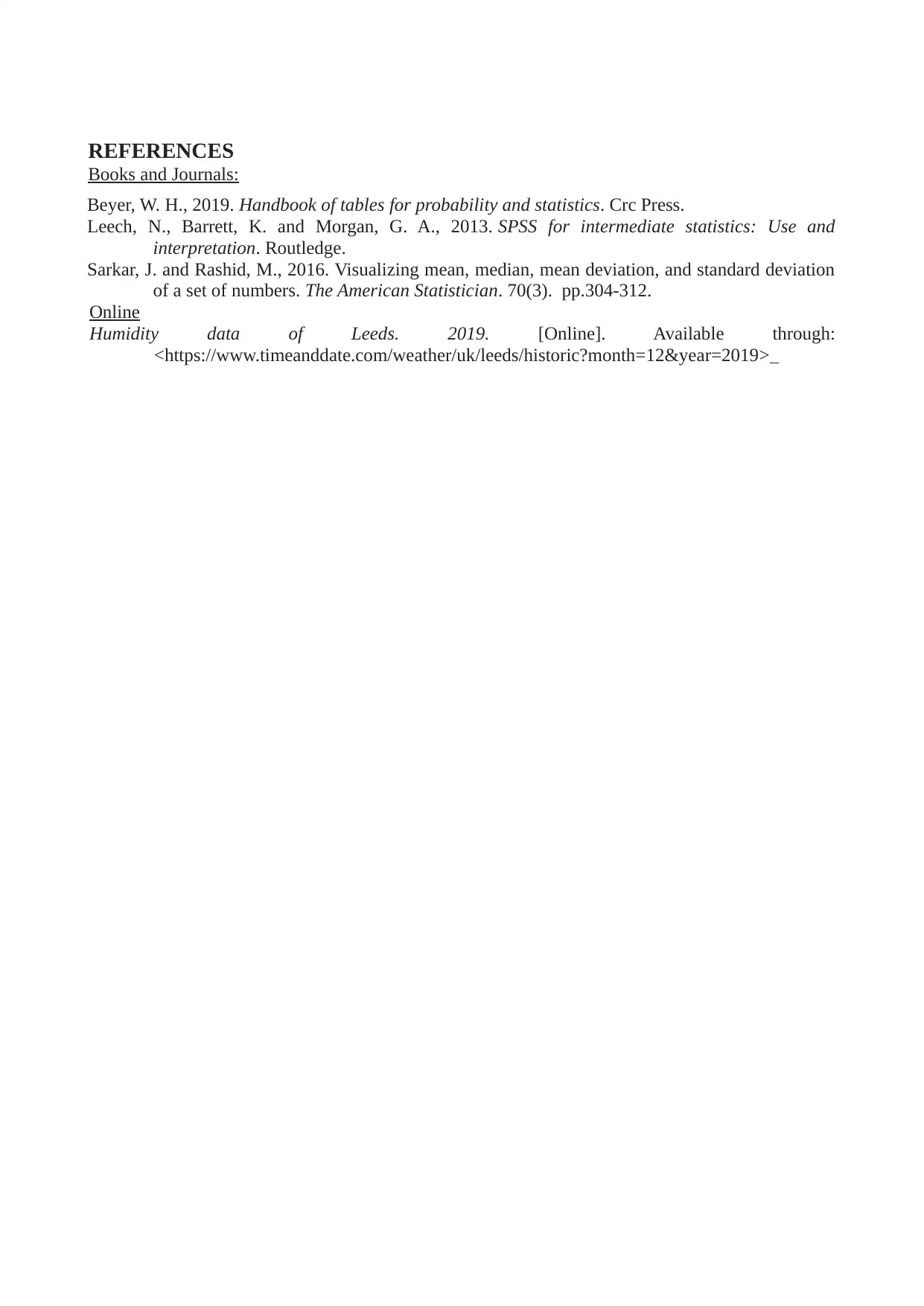
REFERENCES
Books and Journals:
Beyer, W. H., 2019. Handbook of tables for probability and statistics. Crc Press.
Leech, N., Barrett, K. and Morgan, G. A., 2013. SPSS for intermediate statistics: Use and
interpretation. Routledge.
Sarkar, J. and Rashid, M., 2016. Visualizing mean, median, mean deviation, and standard deviation
of a set of numbers. The American Statistician. 70(3). pp.304-312.
Online
Humidity data of Leeds. 2019. [Online]. Available through:
<https://www.timeanddate.com/weather/uk/leeds/historic?month=12&year=2019>
Books and Journals:
Beyer, W. H., 2019. Handbook of tables for probability and statistics. Crc Press.
Leech, N., Barrett, K. and Morgan, G. A., 2013. SPSS for intermediate statistics: Use and
interpretation. Routledge.
Sarkar, J. and Rashid, M., 2016. Visualizing mean, median, mean deviation, and standard deviation
of a set of numbers. The American Statistician. 70(3). pp.304-312.
Online
Humidity data of Leeds. 2019. [Online]. Available through:
<https://www.timeanddate.com/weather/uk/leeds/historic?month=12&year=2019>
1 out of 8
Related Documents
Your All-in-One AI-Powered Toolkit for Academic Success.
+13062052269
info@desklib.com
Available 24*7 on WhatsApp / Email
![[object Object]](/_next/static/media/star-bottom.7253800d.svg)
Unlock your academic potential
Copyright © 2020–2026 A2Z Services. All Rights Reserved. Developed and managed by ZUCOL.





